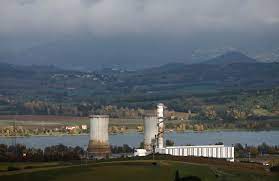Italy Set to Scale Back Remaining Coal-Fired Fleet

Italy could retire most of its remaining coal-fired power plants in the next two years, as government officials work to meet the European Union’s 2030 goal for lower emissions of carbon from the electricity and industrial sectors.
Energy Minister Gilberto Pichetto Fratin, commenting on a government document released July 3, said Italy would end the use of fuel oil for power generation and cut coal-fired electricity output to a minimum. Fratin in a statement said the goal is to accelerate decarbonization efforts “while guaranteeing our country’s energy security.”
Fratin said more use of renewable energy resources, including increased hydropower output, and natural gas—the country’s natural gas storage sites were 82% full at the end of June—would allow for reductions in the use of coal and fuel oil. Fratin also said demand for electricity has dropped.
Italy last year increased its production of electricity from coal to 7.5% of its total generation, up from 4.6% in 2021, as it sought to offset the loss of natural gas from Russia after that country’s invasion of Ukraine. Officials on Monday said the country could now scale back emergency measures that were implemented last year to support the energy supply. They noted, though, that the island of Sardinia likely will remain dependent on coal-fired generation past 2025 because alternative energy resources have been slow to develop there.
The Fiume Santo station is a 640-MW coal-fired power plant on the Italian island of Sardinia. The plant is one of two on the island that would remain in operation after 2025, as Italy closes most of its other coal-fired generating units. Source: Wikimedia Commons
Government data shows six coal-fired power plants, with 14 total units with about 6,000 MW of generation capacity, are still operating in Italy. That number includes two power plants, with four units with 1,130 MW of total generation, in Sardinia.
Fratin’s agency in its latest report said the energy ministry is working to cut emissions across several sectors in addition to power generation, including transportation, residential, commercial and industrial, and agriculture. The country has a goal to reduce carbon emissions as much as 37% by 2030, compared to 2005 levels, though that is below the EU’s goal for Italy of a 43.7% reduction by 2030.
The ministry in its report wrote, “To comply with the 2021-2030 emission trajectory, which will have to lead to achieving the -43.7% target … it will be necessary to immediately initiate a significant reduction in emissions of more than 30% compared to 2021 levels.”
Decarbonization Policies
Italy’s Prime Minister Giorgia Meloni on Monday said the EU’s decarbonization policies could have negative impacts on the country. Meloni in a statement said, “It cannot be assumed that we can dismantle our economy and our companies to start the ecological transition … ecological transition and environmental sustainability must go hand in hand with social and economic sustainability.”
Italian officials sent their latest national plan for energy and climate to EU’s headquarters in Brussels, Belgium, in late June. Officials said they plan to work with the European Commission to reach a binding energy and climate strategy by June of next year. It’s expected that state-run energy companies, including Enel and Eni, will increase their investments in renewable energy, along with carbon capture technologies, over the next several years.





